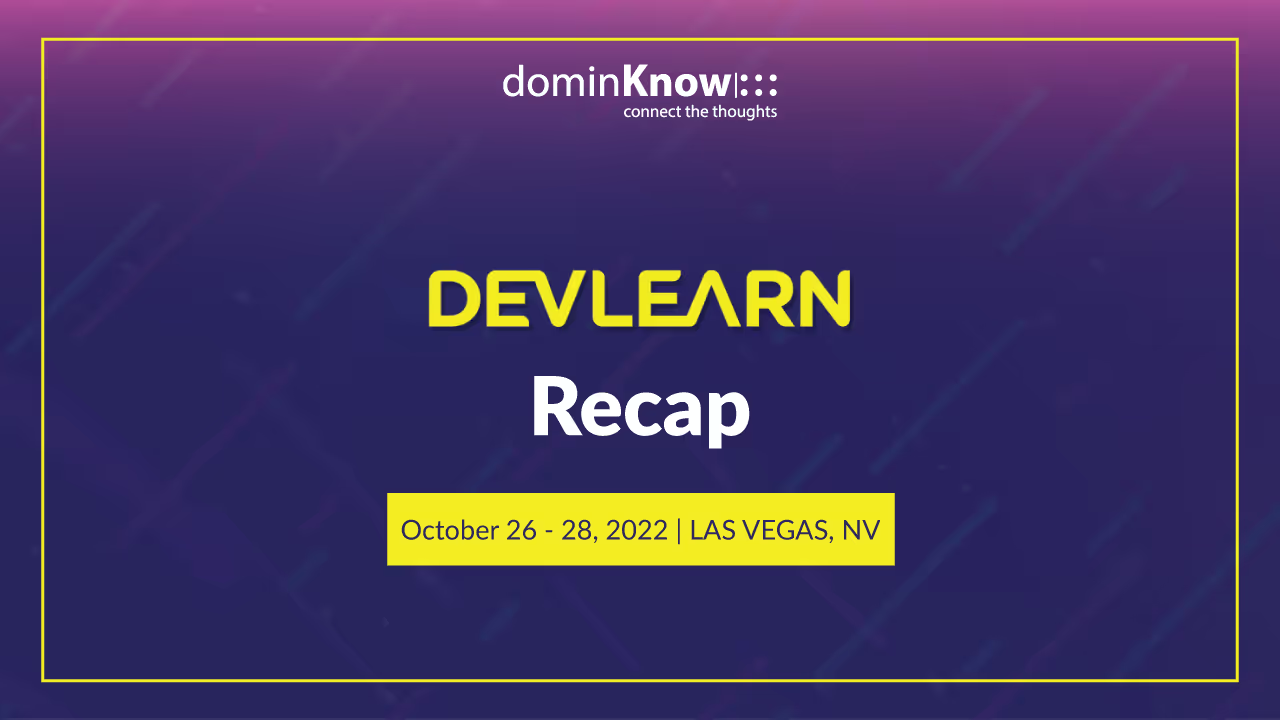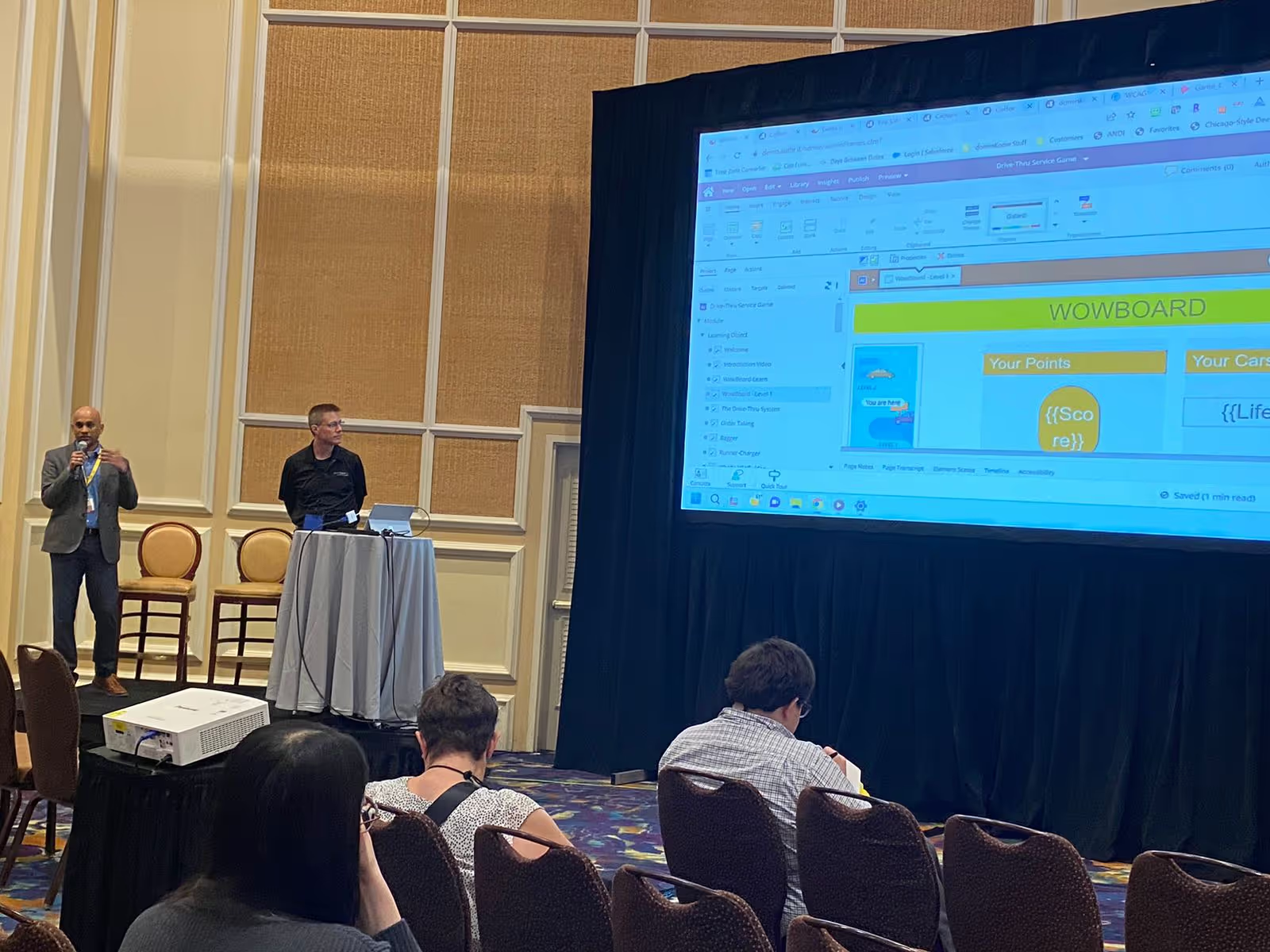dominKnow x Harbinger Group at DevLearn 2022






DevLearn is a place for ideas to generate conversation. From the stage sessions to the buzz on the show floor, topics range from xAPI, to Micro Learning, to Accessibility, and to flat out getting back to basics. Such topics came up during the Live broadcast of our podcast, IDIODC. Brent, one half of our IDIODC hosting team, spoke to early bird DevLearn attendees. Chris Van Wingerden was able to attend virtually via Crowdcast and provided witty banter along with astute observations. Various guests answered questions and provided ideas through a man-on-the-street style interview about the top trends in eLearning that instructional designers face every day. Throughout the conversation, the common thread was curiosity and an interest in pushing instructional design best practices further into the future.
Of course, one can only get so far, with creating courses, without an authoring tool. As such, authoring tools and course design are always top of mind with instructional designers. There’s an ever-present struggle of content strategy vs content tactics. A strategy involves the solving a problem through an overarching message, an action plan if you will. On the other hand, a tactic is a means of individual steps and executions to achieve the desired results.
Overall, when designing a course, strategy is where you should place your bets. In the long run, it’s the strategy that will carry a cohesive message. The right strategy involves achieving goals that facilitate change and objectives being met. This is especially important when designing courses, so users benefit from learning something of value designed to aid them in their knowledge base and or skill set.
A one-off tactic will only provide short term results and may be an eyesore when compared to previous courses and or messaging. As a result, tactics are really tools within a strategy and are not to be used on their own without an overarching message to contextualize objectives/goals.
If an idea is used correctly, through a strategy, it can be an extremely effective means of creating change in learners. For example, gamification is a hot buzzword in the instructional designer community. Designers have utilized gamification approaches as part of a strategy to increase engagement, productivity, and motivation. According to a Zippia study, “72% of people say gamification motivates them to do tasks and work harder on the job.” That same study indicates that, “Gamification in education is expected to grow at a compound annual growth rate of 14% between now and 2025. At that rate, the market will be worth $25.7 billion in 2025—$12.3 billion more than the current market value.”
Gamification is a lot more serious than one would expect. That’s exactly why dominKnow’s own Paul Schneider, PhD., and Harbinger Group’s Shrikant Pattathil came together on DevLearn’s Tools & Techniques Stage (Stage D) for their speaking session, Dissection of a Project Utilizing Game Design: A Discussion.

On Thursday, October 27, both gentlemen took the stage to present "Drive-Thru Service Game: Be a Headset Hero!". This course is the brainchild of Harbinger Group, who are a leader in delivering innovative learning solutions for various verticals. The course puts the employee in a real-world situation where they are presented with a variety of customers in a drive thru and need to listen and respond to each of the multilevel situations.
Throughout the session, both presenters answered questions from those in the crowd and attendees who had submitted questions beforehand via the dominKnow DevLearn landing page.
Here’s a rundown of the questions answered.
Just like in real life, customers that come through a drive thru provide instant feedback about products and services. The employee is then tasked with handling different and sometimes difficult situations customers present while completing orders, taking action, and providing the appropriate response.
One of the key strategic goals of this training was to enable employees to gain a better understanding of the effect of cumulative interactions on a guest. The tactic utilized was providing gaming elements to measure and provide direct insight into the cumulative effect of the employee’s choices.
When the employee provided an answer there were several elements that provided both direct and cumulative feedback:
Timebound service is an important aspect of the restaurant’s customer service experience. A timer was added to the game to simulate the actual conditions at one of their typical drive-through stations. This was based on the standard time it should take to complete an order from the moment a customer reaches a drive-thru to the time they receive their order. The purpose is to make learners aware of the standard order completion time and give them an opportunity to practice quick thinking, decision making, and customer service under pressure.
The timer kicks in in the second round of the game where the learner needs to attempt all the questions in one customer order in a given time limit of 3 minutes and 30 seconds. In designing this interaction, we had no need for programing and were able to rely solely on out of the box dominKnow | ONE features including the Timer, Actions and Triggers and Variables capabilities. The timer runs during a question, pauses during the feedback, and resumes in the next question till all the questions are completed or till the timer runs out.
For more information on creating custom courses like Headset Hero, reach out to our partner Harbinger. With over 30 years of experience, Harbinger has created innovative learning solutions that excite learners. Whether you’re looking for content transformation or gamification, Harbinger provides the right amount of creativity and technology to engage learners.
Be it together on a stage at DevLearn, or in the dominKnow Marketplace, dominKnow and Harbinger offer a turn-key solution that provides end-to-end eLearning design and development. your free 14-day trial today and download Headset Hero from the dominKnow | ONE Marketplace to learn more.
.avif)
Instructional Designers in Offices Drinking Coffee (#IDIODC) is a free weekly eLearning video cast and podcast that is Sponsored by dominknow.
Join us live – or later in your favourite app!
Check out how dominKnow | ONE can help you with gamification in eLearning